Once again. Stereo vision (a pair of eyes, twins) makes
for seeing in depth. From the glyphs we can
observe
that the G text obviously flows on past the end of
side a on to the beginning of side b:
|
 |
10
|
 |
|
Ga8-16 (219) |
Gb1-1 (230) |
|
DOUBLE DOUBLE |
DENEB OKAB |
|
Dec 29 (363) |
Jan 9 |
Can we detect a similar phenomenon where the
B text changes from side a to side b or from
side b to side a?
 |
 |
 |
 |
|
Bb12-28 |
Bb12-29 |
Bb12-30 |
Bb12-31 (492) |

 |
 |
 |
 |
 |
 |
 |
|
Bb12-32 |
Bb12-33 |
Bb12-34 |
Bb12-35 |
Bb12-36 |
Bb12-37 |
Bb12-38 (499) |
 |
 |
 |
 |
 |
 |
 |
|
Bb12-39 |
Bb12-40 |
Bb12-41 |
Bb12-42 |
Bb12-43 |
Bb12-44 |
Bb12-45 (506) |
 |
 |
 |
 |
 |
|
Ba1-1 |
Ba1-2 |
Ba1-3 (509) |
Ba1-4 |
Ba1-5 |
 |
 |
 |
 |
 |
|
Ba1-6 |
Ba1-7 |
Ba1-8 |
Ba1-9 |
Ba1-10 (516) |
I cannot detect any clear indication
here of such an
attempt
when moving ahead from turning the B
tablet around from side b to side a.
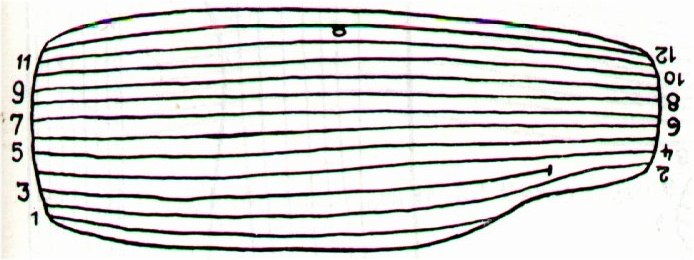
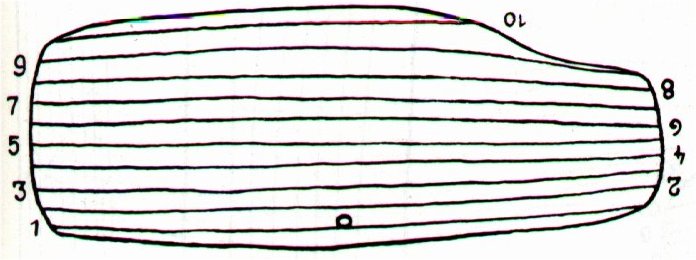
The hole in the tablet made it easy to
hang it on a post or wall, implying side
b should be the front side.
... Consequently we could begin to read
the text either at the beginning of side
a or at the beginning of side b of the B
tablet. But as the old world order
presumably came before the new order of
the Sun we ought to begin with side a.
Also Metoro began his reading with the
zikru ('figure') in Ba1-1 ...
However, there are 12 more such glyphs
looking exactly the same:
 |
 |
 |
 |
 |
 |
|
Ba8-30 |
Ba10-29 |
Bb1-25 |
Bb2-17 |
Bb4-10 |
Bb5-15 |
 |
 |
 |
 |
 |
 |
|
Bb5-27 |
Bb6-26 |
Bb6-32 |
Bb7-6 |
Bb7-19 |
Bb10-20 |
| |
 |
 |
|
|
Bb12-9 |
Bb12-35 |
There is thus a suggestion of continuity from
Ba8-30 to Bb12-35, where the
maro string should indicate the
final place - possibly referring
to the dry (maro) month
named
Maro (June).
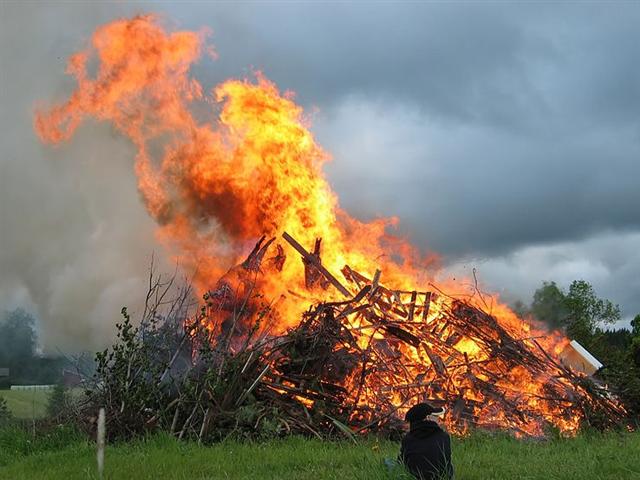
According to E:91 Nuku Kehu
(the master shipbuilder, E:58)
Kehu (cfr ehu).
Hidden; what cannot be seen
because it is covered;
he-kehu te raá, said of the
sun when it has sunk below the
horizon. Vanaga. Kehu,
hakakehu, to hide, disguise,
feint, feign, to lie in wait.
Kekehu, shoulder G.
Churchill.
marked the boundary for the king
with feather garlands (te
maro):
... The name of the residence (maara
noho) of the king, of Hotu,
was Oromanga. The name of the
place where the roof of the
house had been covered [hidden,
kona] by Nuku Kehu was
Hare Topa (sic!) Tuu. Nuku Kehu
was also in charge of the
feather garlands (maro),
which served to mark the
boundaries of the royal
residence. He had pounded (the
staffs with the feather
garlands) into the ground [he
maro tokoa te mee.a Nuku Kehu.i
tuki.mai].
The middle (te tini) was
located in front of the bay of
Hanga Rau [te
tini o mua i te hanga.o hanga
rau]. The feather
garlands went up, continued, and
reached Puku Parari [i
iri ai te maro.i oho.ai.he tuu
ki puku parari]. They
went up again and reached Puku O
Heha [he
iri hokoou he tuu.ki puku o heha].
From Puku O Heha they formed (a
line) to the side, to Aro Huri [i
hakataha hokoou ai ka aro huri].
From Aro Huri they turned again
toward the sea [i
hoki hokoou ai.a tai]
and reached Maunga Koua [he
tuu ki maunga koua],
went down, went their way, and
reached Hira Moko [he
turu he oho.he tuu ki hira moko].
(He) made a second line (?
he
rua taupa) of feather
garlands.
|
Side a |
Side b |
|
323 |
 |
97 |
495 |
 |
10 |
|
Ba8-30 (324) |
Bb12-35 (496) |
|
421 |
506 |
|
927 |
496 - 324 = 172 = 182 - 10 = 428
- 256 = 4 * 107 - 4 * 64 = 4 *
43 (→ 443 → 15 * 29½).
|
a1 |
47 |
47 |
b1 |
31 |
31 |
|
a2 |
40 |
87 |
b2 |
47 |
78 |
|
a3 |
37 |
124 |
b3 |
43 |
121 |
|
a4 |
40 |
164 |
b4 |
42 |
163 |
|
a5 |
43 |
207 |
b5 |
40 |
203 |
|
a6 |
44 |
251 |
b6 |
40 |
243 |
|
a7 |
43 |
294 |
b7 |
41 |
284 |
|
a8 |
30 |
324 |
b8 |
42 |
326 |
|
16 |
340 |
b9 |
50 |
376 |
|
a9 |
49 |
389 |
b10 |
42 |
418 |
|
a10 |
29 |
418 |
b11 |
43 |
461 |
|
3 |
421 |
b12 |
35 |
418 + 78 |
|
|
|
10 |
418 + 88 |
|
sum |
421 |
sum |
506 |
|
Sumerian SAG |
 |
Phoenician
resh |
 |
Greek rho |
Ρ (ρ) |
|
... Resh
(Arabic: rāۥ)
is the twentieth
letter of many
Semitic
alphabets,
including
Phoenician,
Aramaic, Hebrew
... The word
resh is
usually assumed
to have come
from a pictogram
of a head,
ultimately
reflecting
Proto-Semitic
*raۥ(i)š-.
The word's East
Semitic cognate,
rēš-, was
one possible
phonetic reading
of the Sumerian
cuneiform sign
for 'head'
(SAG).
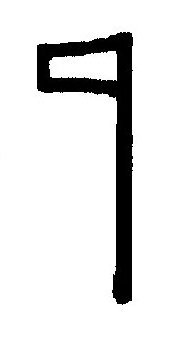
.jpg)
... Then I
become aware of
... a presence -
a faint, ghostly
glimmering, like
moonglow, that
has appeared on
the solstice
stone. I don't
know how long it
lasts, a second
or two only I
would guess, but
while it is
there it seems
less like a
projection -
which I know it
to be - than
something
immanent within
the stone
itself. And it
seems to
function as a
herald for it
fades almost as
soon as it has
appeared and in
its place the
full effect
snaps on -
instantaneously.
It wasn't there,
and then it's
there. As Chris
had described,
the effect does
curiously
resemble a
poleaxe, or a
flag on a pole,
and consists of
a 'shaft',
narrow at the
base but
widening a
little towards
the top, running
up the left hand
side of the
solstice stone,
surmounted by a
right-facing
'head' or
'flag'. An
instant later an
almond-shaped
spot of light,
like an eye,
appears a few
centimeters to
the right of the
'flag' and the
effect is
complete.
Weirdly - I do
not claim it has
any significance
- this
flag-on-a-pole
symbol is the
ancient Egyptian
hieroglyph
neter,
meaning 'god',
or 'a god' - and
not to be
understood at
all in the
Judaeo-Christian
usage of that
word but rather
as a reference
to one of the
supernatural
powers or
principles that
guide and
balance the
universe.
Manifested here,
in this strange
Stone Age
temple, it
glows, as though
lit by inner
fire ...
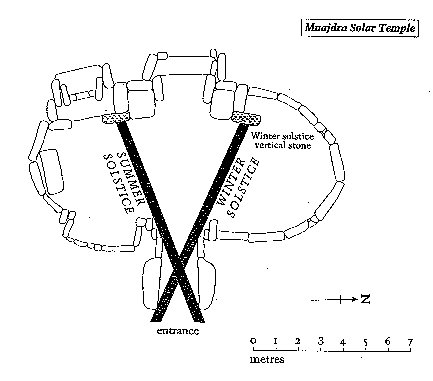
Marija Gimbutas:
'To sleep within
the Goddess's
womb was to die
and to come to
life anew'. In a
system of
reincarnation
the old one must
die in order to
be reborn, of
course. At
midsummer Sun
comes to a
standstill, and
this must
therefore be an
occasion when
the 'flame of
life' had to be
transported into
a new body. |
Number 324, which I have
perceived multiple times
previously in all these
excercises, can be
explained as 294 + 30.
And *324 = 404 = 365 + 39.
|
Takapau |
39 variants of
uhi - STOLEN by
Teke from his
brother Ma'eha
[E:58-64] |
|
 |
18 |
 |
13 |
 |
7 |
 |
|
SIRRA H
(*0) |
ADHIL (*19) |
MIRA (*33) |
BHARANI (*41) |
|
ALCHITA (*183) |
SPICA (*202) |
KHAMBALIA (*216) |
ZUBEN ELGENUBI
(*224) |
|
0h |
39 (= 3 * 13) |
A circle has to be
counted as twice 314.
Twice 324 = 648 = 628 +
20 =
October 10 (283 + 365).
... The Sun promised to move
more slowly in order to
make longer days for fishing.
And as if by design day 144
on side a of the G tablet
marked the
Pillar-to-fish-by:
|
AUG 9 (84 +
137) |
10 (222) |
11 (80 +
143) |
12 (*208 -
*64) |
13 (*145) |
 |
 |
 |
 |
 |
|
Ga6-1 (141) |
Ga6-2 (222 -
80) |
Ga6-3 |
Ga6-4 (144) |
Ga6-5 (290 /
2) |
|
HEZE = ζ
Virginis
(205.0),
Southern
Pinwheel
Galaxy = M83
Hydrae
(205.7) |
ε Centauri
(206.3),
κ Oct.
(206.4)
*165.0 =
*206.4 -
*41.4 |
No star
listed (207) |
τ
Bootis
(208.2),
BENETNASH
(Leader of
the
Daughters of
the Bier) =
η Ursae
Majoris
(208.5),
ν
Centauri
(208.7),
μ
Centauri,
υ
Bootis
(208.8) |
No star
listed (209) |
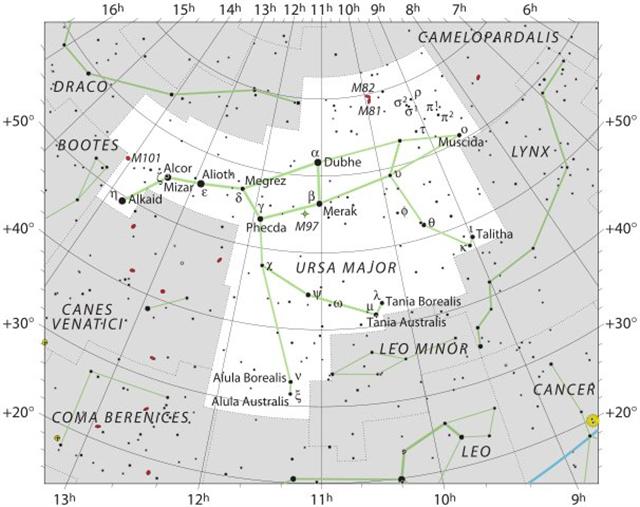 |
|
Oct 12 (285) |
13 |
14 |
15 (*208) |
16 |
|
°Oct 8 |
9 |
10 |
11 (*204) |
12 (285) |
|
'Sept 15 |
16 |
17 (260) |
18 |
19 (*182) |
|
Hora Nui 1 |
2 (245) |
"Sept 3 |
4 |
5 (*168) |
|
... On the
first day of
the month of
September
('Hora Nui')
they went up
to the yam
plantation
of Kuukuu -
i te raa
Po rae o
hora nui i
iri ai ki
runga ki the
uhi a kuukuu
... [E:46].
...
Hotu's
canoe sailed
from
Maori to
Te Pito O
Te Kainga.
It sailed on
the second
day of
September (hora
nui)
... [E:74] |
|
CLOSE TO THE
FULL MOON: |
|
FEBR 8
(*324) |
9 (40) |
10 |
11 |
12 (408) |
|
ACHERNAR
(End of the
River) = α
Eridani
(23.3),
χ
Andromedae
(23.6),
τ
Andromedae
(23.9) |
ALSEIPH
(Scimitar) =
φ Persei
(24.5),
τ
Ceti (24.7) |
No star
listed (25) |
ANA-NIA-10
(Pillar-to-fish
by)
χ Ceti
(26.1),
POLARIS = α
Ursae
Minoris,
BATEN KAITOS
= ζ Ceti
(26.6),
METALLAH = α
Trianguli
(26.9) |
Al
Sharatain-1
/
Ashvini-1 /
Bond-16
(Dog) /
Mahrū-sha-rishu-ku-1
(Front of
the Head of
Ku)
SEGIN = ε
Cassiopeia,
MESARTHIM =
γ Arietis,
ψ
Phoenicis
(27.2),
SHERATAN
(Pair of
Signs) = β
Arietis, φ
Phoenicis
(27.4)
*351.0 =
*27.4 -
*41.4 |
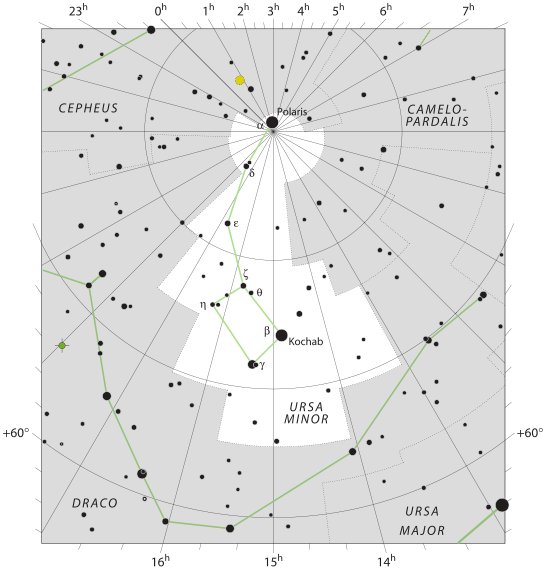 |
|
4-13 → 14 *
29½ |
April 14 |
15 |
16 (471) |
17 (107) |
|
°April 9 |
10 (100) |
11 |
12 (*22) |
13 |
|
'March 17 |
18 |
19 (78) |
20 (*364) |
0h |
|
"March 3 |
4 |
5 (64) |
6 (*350) |
7 |
Then, at *324 + *4,
in February 12,
followed the
Creation of Our Present
World:
|
DEC 7 |
8 |
9 (7 * 7
* 7) |
10 |
11 (345) |
12
(*266) |
 |
 |
 |
 |
 |
 |
|
Gb2-6 |
Gb2-7 |
Gb2-8 |
Gb2-9
(35) |
Gb2-10 |
Gb2-11
(266) |
|
CLOSE TO
THE FULL
MOON: |
|
BUNDA
(Foundation)
/ KAKKAB
NAMMAΧ
(Star of
Mighty
Destiny) |
θ Piscis
Austrini
(330.1),
λ Oct.
(330.7) |
|
Al Sa'd
al
Su'ud-22
(Luckiest
of the
Lucky) /
Emptiness-11
(Rat)
TSIN =
36
Capricorni
(325.2),
ALPHIRK
(The
Flock) =
β Cephei
(325.7),
SADALSUD
=
β
Aquarii,
ξ
Gruis
(325.9) |
No star
listed
(326) |
CASTRA =
ε
Capricorni
(327.2),
BUNDA =
ξ
Aquarii
(327.5)
SIRIUS
(α Canis
Majoris)
|
Mahar
sha
hi-na
Shahū-26
(Western
One in
the Tail
of the
Goat)
NASHIRA
=
γ
Capricorni
(328.0),
ν
Oct.
(328.3),
AZELFAFAGE
= π¹
Cygni,
κ
Capricorni
(328.7) |
Arkat
sha
hi-na
Shahū-27
(Eastern
One in
the Tail
of the
Goat)
ENIF
(The
Nose) =
ε
Pegasi,
ERAKIS =
μ
Cephei
(329.2),
46
CAPRICORNI,
JIH (the
Sun)
= κ
Pegasi
(329.3),
ι
Piscis
Austrini
(329.4),
λ
Capricorni
(329.6),
ν
Cephei
(329.7),
DENEB
ALGIEDI
=
δ
Capricorni
(329.8)
*288.0 =
*329.4 -
*41.4 |
|
Febr 9
(40) |
10 |
(343 +
64) |
(408 =
43 +
365) |
13 |
All
Hearts'
Day |
|
... On
February
9 the
Chorti
Ah K'in,
'diviners',
begin
the
agricultural
year.
Both the
260-day
cycle
and the
solar
year are
used in
setting
dates
for
religious
and
agricultural
ceremonies,
especially
when
those
rituals
fall at
the same
time in
both
calendars.
The
ceremony
begins
when the
diviners
go to a
sacred
spring
where
they
choose
five
stones
with the
proper
shape
and
color.
These
stones
will
mark the
five
positions
of the
sacred
cosmogram
created
by the
ritual.
When the
stones
are
brought
back to
the
ceremonial
house,
two
diviners
start
the
ritual
by
placing
the
stones
on a
table in
a
careful
pattern
that
reproduces
the
schematic
of the
universe.
At the
same
time,
helpers
under
the
table
replace
last
year's
diagram
with the
new one.
They
believe
that by
placing
the
cosmic
diagram
under
the base
of God
at the
center
of the
world
they
demonstrate
that God
dominates
the
universe.
The
priests
place
the
stones
in a
very
particular
order.
First
the
stone
that
corresponds
to the
sun in
the
eastern,
sunrise
position
of
summer
solstice
is set
down;
then the
stone
corresponding
to the
western,
sunset
position
of the
same
solstice.
This is
followed
by
stones
representing
the
western,
sunset
position
of the
winter
solstice,
then its
eastern,
sunrise
position.
Together
these
four
stones
form a
square.
They sit
at the
four
corners
of the
square
just as
we saw
in the
Creation
story
from the
Classic
period
and in
the
Popol
Vuh.
Finally,
the
center
stone is
placed
to form
the
ancient
five-point
sign
modern
researchers
called
the
quincunx
...

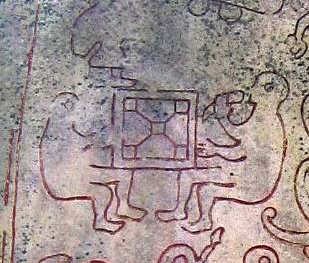
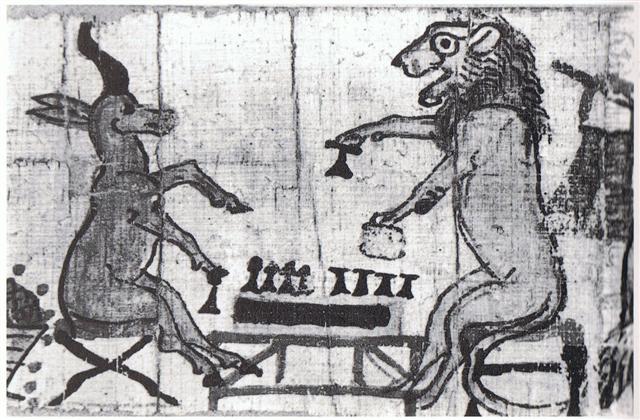 |
|
°Febr 5 |
6 |
7 |
8 (*324) |
9 |
10 (41) |
|
'Jan 13
(378) |
14 |
15
(*300) |
16 |
17 |
18 (383) |
|
"Dec 30
|
31 |
"Jan 1 |
2 |
3 (368) |
4 |
|
CLOSE TO
THE SUN: |
|
JUNE
7 (*78) |
8 |
9 |
10 (161) |
11 |
12 |
|
Fibonacci:
1, 1, 2,
3, 5, 8,
13, 21,
34, 55
... →
1.618033998
... = φ
= (1 +
√5) / 2.
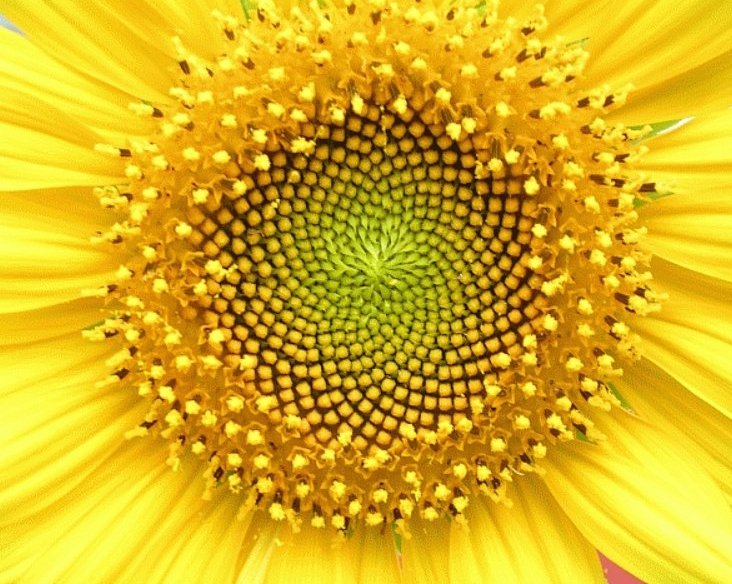 |
|
The Knot
(Ukdah) |
5 Imix 9
Kumk'u
Rishu
A.-13
(Head of
the
Lion)
ψ Leonis
(146.4),
RAS
ELASET
AUSTRALIS
= ε
Leonis
(146.6)
*105.0 =
*146.4 -
*41.4 |
VATHORZ
PRIOR =
υ
Carinae
(147.9) |
|
Star-25
(Horse)
/
ANA-HEU-HEU-PO-5
(Pillar
where
debates
were
held)
ALPHARD
(The
Horse)
=
α
Hydrae
(142.3),
ω
Leonis
(142.6),
τ¹
Hydrae
(142.7) |
Al
Tarf-7
(The
End)
ψ
Velorum
(143.3),
ALTERF =
λ
Leonis,
τ²
Hydrae
(143.4),
ξ
Leonis
(143.5)
*102.0 =
*143.4 -
*41.4 |
A Hydrae
(144.1)
VEGA (α
Lyrae)
|
Creation
of our
present
world
UKDAH
(Knot) =
ι
Hydrae
(145.4),
κ
Hydrae
(145.5),
SUBRA =
ο
Leonis
(145.8)
*104.0 =
*145.4 -
*41.4
ALPHEKKA
MERIDIANA |
|
Aug 10 |
11 |
12 |
13
(*145) |
14 |
15 (227) |
|
°Aug 6 |
7 |
8 (220) |
9 |
10 |
11
(*143) |
|
'July 14 |
15 |
16 |
17
(*118) |
18 |
19 (200) |
|
"June 30 |
"July 1 |
2 |
3 (*104) |
4 |
5 (186) |
 |
 |
 |
|
Ca6-4 |
Ca6-5
(145 =
15 * 15
- 80) |
Ca6-6 |
|
kua
hau te
haú o to
hau tea |
kua
hipu
koia
etoru
hipu |
te
henua ma
te rima |
|
Hipu.
Calabash,
shell,
cup,
jug,
goblet,
pot,
plate,
vase,
bowl,
any such
receptacle;
hipu
hiva,
melon,
bottle;
hipu
takatore,
vessel;
hipu
unuvai,
drinking
glass. P
Mgv.:
ipu,
calabash,
gourd
for
carrying
liquids.
Mq.:
ipu,
all
sorts of
small
vases,
shell,
bowl,
receptacle,
coconut
shell.
Ta.:
ipu,
calabash,
cup,
receptacle.
Churchill.

... Then
the big
Fish did
swallow
him, and
he had
done
acts
worthy
of
blame.
Had it
not been
that he
(repented
and)
glorified
Allah,
He would
certainly
have
remained
inside
the Fish
till the
Day of
Resurrection.
-
Qur'an,
chapter
37
(As-Saaffat),
verse
139–144.
But We
cast him
forth on
the
naked
shore in
a state
of
sickness,
And We
caused
to grow,
over
him, a
spreading
plant of
the
gourd
kind.
And We
sent him
(on a
mission)
to a
hundred
thousand
(men) or
more.
And they
believed;
so We
permitted
them to
enjoy
(their
life)
for a
while. -
Qur'an,
chapter
37
(As-Saaffat),
verse
145–148
...
... The
state of
the tree
loomed
large in
their
thoughts,
because
it came
about at
the same
time the
head of
One
Hunaphu
was put
in the
fork.
The
Xibalbans
said
among
themselves:
'No one
is to
pick the
fruit,
nor is
anyone
to go
beneath
the
tree',
they
said.
They
restricted
themselves,
all of
Xibalba
held
back. It
isn't
clear
which is
the head
of One
Hunaphu;
now it's
exactly
the same
as the
fruit of
the
tree.
Calabash
came to
be its
name,
and much
was said
about
it. A
maiden
heard
about
it, and
here we
shall
tell of
her
arrival
... |
|
CLOSE TO
THE FULL
MOON: |
|
DEC 9 (7
* 7 * 7) |
10 (344) |
11 |
|
Febr 11
(42 =
407 =
343 +
64)
A Hydrae
(144.1)
VEGA (α
Lyrae) |
UKDAH
(Knot) =
ι
Hydrae
(145.4),
κ
Hydrae
(145.5),
SUBRA =
ο
Leonis
(145.8)
*104.0 =
*145.4 -
*41.4
ALPHEKKA
MERIDIANA |
Rishu
A.-13
(Head of
the
Lion)
ψ Leonis
(146.4),
RAS
ELASET
AUSTRALIS
= ε
Leonis
(146.6)
*105.0 =
*146.4 -
*41.4 |
|
CLOSE TO
THE SUN: |
|
Itzam-Yeh defeated |
28 May (148), 3149 BC |
|
1st 3-stone place |
21 May (141), 3114 BC |
|
Creation of our present world |
13 August (225), 3114 BC |
|
Och ta chan (Hun-Nal-Ye 'entered or became the sky') |
5 February (36), 3112 BC |
|
21 May, 3114 BC - 5 February, 3112 BC = 542 |
|
542 'happens to be' the sum of 365 days and 6 * 29½ nights. |
| ... In three magnificent texts at the site of Koba, scribes recorded it as one of the largest finite numbers we humans have ever written. According to these inscriptions, our world was created on the day 4 Ahaw 8 Kumk'u. On this day all the cycles of the Maya calendar above twenty years were set at thirteen - that is to say, the cycles of 400 years, 8,000 years, 160,000 years, 32,000,000 years, and so on, all the way up to a cycle number extending to twenty places (2021 * 1360-day year).
In our calendar, this day fell on August 13, 3114 BC. To understand what this means, we need a little scale. The thirteens in this huge number act like the twelve in our cycles - the next hour after twelve is one. Thirteen changed to one as each of these cycles in the Maya calendar was completed, therefore, we have the following sequence:
|
13. |
13. |
13. |
0. |
0. |
0. |
1. |
5 Imix |
9 Kumk'u |
(Aug. 14, 3114 B.C.) |
|
13. |
13. |
13. |
0. |
0. |
1. |
0. |
11 Ahaw |
3 Pop |
(Sept. 2, 3114 B.C.) |
|
13. |
13. |
13. |
0. |
1. |
0. |
0. |
13 Ahaw |
3 Kumk'u |
(Aug.7, 3113 B.C.) |
|
13. |
13. |
13. |
1. |
0. |
0. |
0. |
2 Ahaw |
8 Mak |
(May 1, 3094 B.C.) |
|
13. |
13. |
1. |
0. |
0. |
0. |
0. |
3 Ahaw |
13 Ch'en |
(Nov. 15, 2720 B.C.) |
|
13. |
13. |
13. |
0. |
0. |
0. |
0. |
4 Ahaw |
3 K'ank'in |
(Dec. 23, A.D. 2012) |
|
13. |
1. |
0. |
0. |
0. |
0. |
0. |
10 Ahaw |
13 Yaxk'in |
(Oct. 15, A.D. 4772) |
|
1. |
0. |
0. |
0. |
0. |
0. |
0. |
7 Ahaw |
3 Zotz' |
(Nov. 22, A.D. 154587) |
|
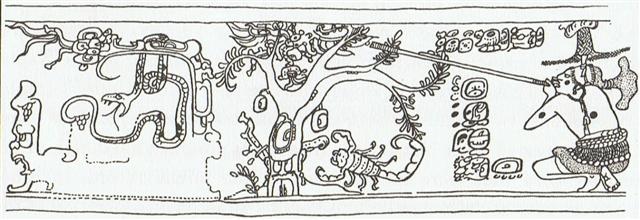
... This
pot
depicts
one of
the Hero
Twins
(One-Ahaw
in the
Classic
texts
and
One-Hunaphu
in the
K'iche'
Popol
Vuh) and
a great
bird who
is
trying
to land
in a
huge
ceiba
tree
heavy
with
fruit.
This
mythical
bird is
Itzam-Yeh,
Classic
prototype
of
Wuqub-Kaqix,
'Seven-Macaw',
of Popol
Vuh
fame. In
that
story,
in the
time
before
the sky
was
lifted
up to
make
room for
the
light,
the
vainglorious
Seven-Macaw
imagined
himself
to be
the sun.
Offended
by his
pride,
the Hero
Twins
humbled
him by
breaking
his
beautiful
shining
tooth
with a
pellet
from
their
blowgun.
This pot
shows
One-Ahaw
aiming
at the
bird as
he
swoops
down to
land in
his
tree. As
Itzam-Yeh
lands on
his
perch,
the text
tells us
he is
'entering
or
becoming
the
sky'.
This
particular
'sky-entering'
is not
the one
mentioned
in the
Palenque
text. It
is the
final
event
that
occurred
in the
previous
creation
before
the
universe
was
remade.
Before
the sky
could be
raised
and the
real sun
revealed
in all
its
splendor,
the Hero
Twins
had to
put the
false
sun,
Itzam-Yeh,
in his
place.
If the
date on
this pot
corresponds
to that
pre-Columbian
event,
as we
believe
it does,
then
Itzam-Yeh
was
defeated
on
12.18.4.5.0.1
Ahaw
3
K'ank'in
(May 28,
3149
B.C.).
After
the new
universe
was
finally
brought
into
existence,
First
Father
also
entered
the sky
by
landing
in the
tree,
just as
Itzam-Yeh
did
...
Itzam-Yeh
was a
name for
Ursa
Major:
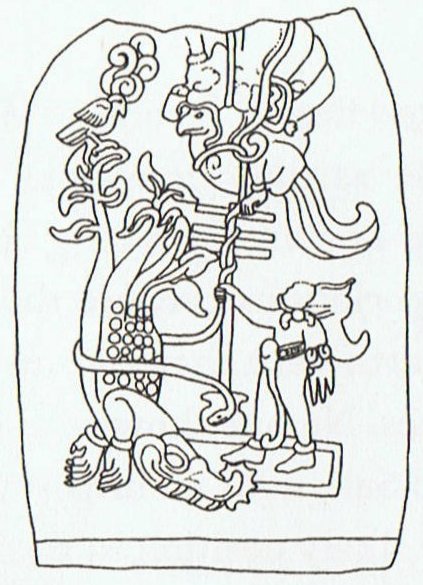
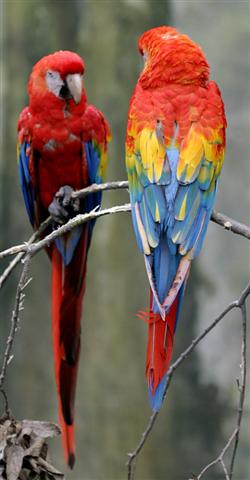 |
|
JUNE 9 |
10 (161) |
11 |
|
Aug 12
(224) |
Creation
of our
present
world |
5 Imix 9
Kumk'u |
|
CASTRA =
ε
Capricorni
(327.2),
BUNDA =
ξ
Aquarii
(327.5)
SIRIUS
(α Canis
Majoris) |
Mahar
sha
hi-na
Shahū-26
(Western
One in
the Tail
of the
Goat)
NASHIRA
=
γ
Capricorni
(328.0),
ν
Oct.
(328.3),
AZELFAFAGE
=
π¹
Cygni,
κ
Capricorni
(328.7) |
Arkat
sha
hi-na
Shahū-27
(Eastern
One in
the Tail
of the
Goat)
ENIF
(The
Nose) =
ε
Pegasi,
ERAKIS =
μ
Cephei
(329.2),
46
CAPRICORNI,
JIH (the
Sun)
=
κ
Pegasi
(329.3),
ι
Piscis
Austrini
(329.4),
λ
Capricorni
(329.6),
ν
Cephei
(329.7),
DENEB
ALGIEDI
=
δ
Capricorni
(329.8)
*288.0 =
*329.4 -
*41.4 |
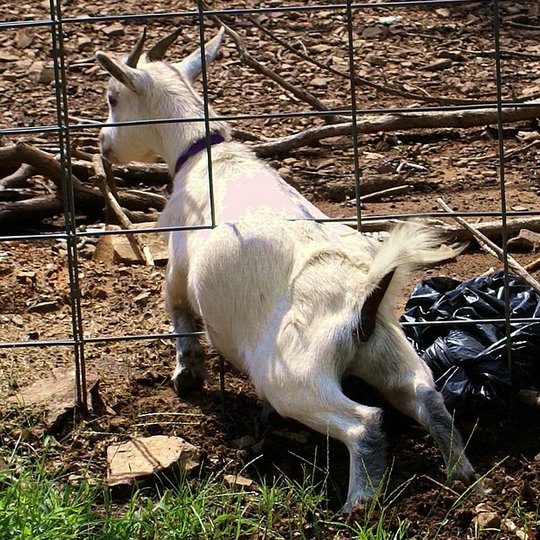 |
 |
 |
 |
 |
|
Ca6-7
(132
+
15) |
Ca6-8
(148
=
228
-
80) |
Ca6-9 |
Ca6-10 |
|
etoru
kiore |
te
henua
te
rima |
|
...
In
China,
with
Capricornus,
Pisces,
and
a
part
of
Sagittarius,
it
[Aquarius]
constituted
the
early
Serpent,
or
Turtle,
Tien
Yuen;
and
later
was
known
as
Hiuen
Ying,
the
Dark
Warrior
and
Hero,
or
Darkly
Flourishing
One,
the
Hiuen
Wu,
or
Hiuen
Heaou,
of
the
Han
dynasty,
which
Dupuis
gave
as
Hiven
Mao.
It
was
a
symbol
of
the
emperor
Tchoun
Hin,
in
whose
reign
was
a
great
deluge;
but
after
the
Jesuits
came
in
it
became
Paou
Ping,
the
Precious
Vase.
It
contained
three
of
the
sieu,
and
headed
the
list
of
zodiac
signs
as
the
Rat,
which
in
the
far
East
was
the
ideograph
for
'water',
and
still
so
remains
in
the
almanacs
of
Central
Asia,
Cochin
China,
and
Japan
...
Kiore.
Rat.
Vanaga.
Rat,
mouse;
kiore
hiva,
rabbit.
P
Pau.,
Mgv.:
kiore,
rat,
mouse.
Mq.:
kioē,
íoé,
id.
Ta.:
iore,
id.
Churchill.

... The Moon rabbit in folklore is a rabbit that lives on the moon ... The story exists in many cultures, particularly in Aztec mythology and East Asian folklore, where it is seen pounding in a mortar and pestle.
|
JUNE 17 (168) |
|

|
|
PESTLE |
|
REGULUS |
In
Chinese
folklore,
it
is
often
portrayed
as a
companion
of
the
moon
goddess
Chang'e,
constantly
pounding
the
elixir
of
life
for
her;
but
in
Japanese
and
Korean
versions,
it
is
just
pounding
the
ingredients
for
rice
cake
... |
|
CLOSE
TO
THE
FULL
MOON: |
|
DEC
12 |
LUCIA |
14 |
15
(349
= 14
*
29½
-
64) |
|
Febr
14
(45
=
227
-
182)
θ
Piscis
Austrini
(330.1),
λ
Oct.
(330.7)
All
Hearts'
Day |
15
(46
=
411)
KUH
(Weeping)
= μ
Capricorni
(331.4),
γ
Gruis
(331.5)
*290.0
=
*331.4
-
*41.4 |
16
(229
+
183)
No
star
listed
(332) |
17
(14
*
29½)
η
Piscis
Austrini
(333.4)
*292.0
=
*333.4
-
*41.4 |
If the beginning of the C text was designed (as I have suggested) to be where Algenib Pegasi (*1) was at the Full Moon in September 22 (264 = 81 + 183) - according to my assumed epoch of rongorongo - then the position 147 days (glyphs) later should be when Kuh (264 + 147 - 80 = *331) was at the Full Moon.
|
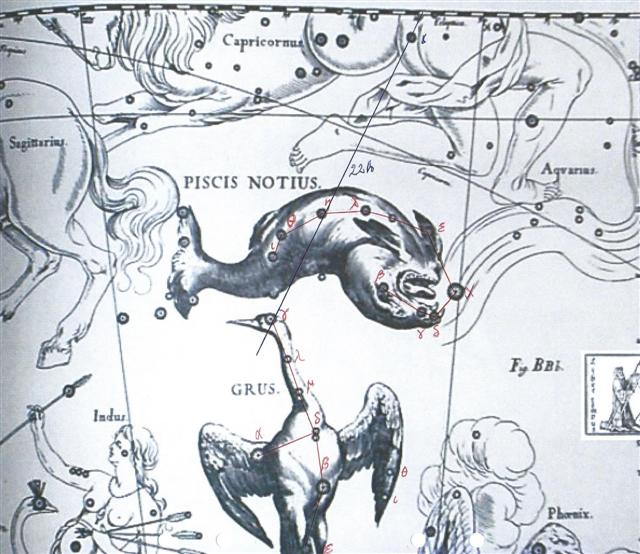 |
|
CLOSE
TO
THE
SUN: |
|
JUNE
12
(163) |
13
(347
-
183
=
228
-
64) |
14
(165) |
15 |
|
Aug
15
(227
→π ) |
16
(187
+
41) |
17
(229) |
18
(150
+
80) |
|
VATHORZ
PRIOR
= υ
Carinae
(147.9) |
υ¹
Hydrae
(148.4),
RAS
ELASET
BOREALIS
(Northern
Head
of
the
Lion)
=
μ
Leonis
(148.7)
*107.0
=
*148.4
-
*41.4 |
TSEEN
KE
(Heaven's
Record)
=
φ
Velorum
(149.9) |
ν
Leonis
(150.1),
π
Leonis
(150.6) |
|
Thus,
in
August
16
(227
+ 1
= 80
+
148)
these
3
sitting
'rats'
would
have
been
visible
close
to
the
Full
Moon.
And
according
to
the
epoch
of
Bharani
their
position
would
have
been
in
day
228
- 41
=
187
("July
6) =
*107
(=
472
-
365
= 41
+
66).
The
stars
could
not
be
observed
when
they
were
close
to
the
Sun
and
therefore
the
nakshatra
stars
must
be
observed
instead.
These
should
therefore
be
illustrated
in
the
rongorongo
text
rather
than
those
stars
which
were
hidden
by
the
fierce
rays
from
the
Sun.
| CLOSE TO THE FULL MOON: |
|
DEC 16 (350 = 80 + 270) |
|

|

|
|
Gb2-15 (270) |
Ca6-11 (151) |
|
Febr 18 (414 = 350 + 64) |
|
SADALMELIK (22h) |
|
CLOSE TO THE SUN: |
|
JUNE 17 (168 = 350 - 182) |
|
Aug 20 (232 = 414 - 182) |
|
REGULUS (10h) |
|
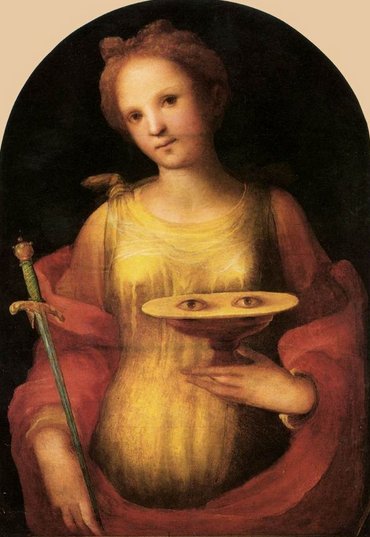
|








































.jpg)





























